The Heysel Stadium disaster was a crowd disaster that occurred on 29 May 1985 when Juventus fans were escaping from an attack by Liverpool fans while they were pressed against a wall in the Heysel Stadium in Brussels, Belgium, before the start of the 1985 European Cup final. The stadium was in need of maintenance and had not been adequately updated It had failed inspections prior to the disaster, and the wall collapsed under the force. Thirty-nine people—mostly Italians and Juventus fans—were killed and 600 were injured in the confrontation.

The Hillsborough disaster was a fatal crowd crush at a football match at Hillsborough Stadium in Sheffield, South Yorkshire, England, on 15 April 1989. It occurred during an FA Cup semi-final between Liverpool and Nottingham Forest in the two standing-only central pens within the Leppings Lane stand allocated to Liverpool supporters. Shortly before kick-off, police match commander David Duckenfield ordered exit gate C to be opened in an attempt to ease crowding, which led to an influx of supporters entering the pens. This resulted in overcrowding of those pens and the fatal crush; with a total of 97 fatalities and 766 injuries, the disaster is the deadliest in British sporting history. Ninety-four people died on the day; one more died in hospital days later, Tony Bland died in 1993, and in 2021, a 97th person died. Both Bland and the 97th victim had suffered irreversible brain damage on the day. The match was abandoned and restaged at Old Trafford in Manchester on 7 May 1989; Liverpool won and went on to win that season's FA Cup.
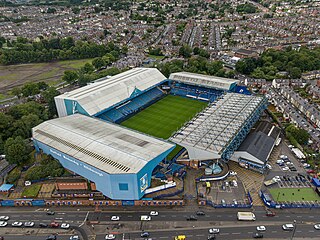
Hillsborough Stadium is a football stadium in the area of Owlerton, Sheffield, South Yorkshire, England. With a total capacity of 39,732, it has been the home of Sheffield Wednesday Football Club since opening in 1899.
Kelvin Calder MacKenzie is an English media executive and a former newspaper editor. He became editor of The Sun in 1981, by which time the publication had been established as Britain's largest circulation newspaper. After leaving The Sun in 1994, he was appointed to executive roles in satellite television and other broadcasting outlets, as well as being involved in a number of publishing enterprises.
The Hillsborough Stadium Disaster Inquiry report is the report of an inquiry which was overseen by Lord Justice Taylor, into the causes of the Hillsborough disaster in Sheffield, South Yorkshire, England, on 15 April 1989, as a result of which, at the time of the report, 95 Liverpool fans had died. An interim report was published in August 1989, and the final report was published in January 1990.
Anthony David Bland was a supporter of Liverpool injured in the Hillsborough disaster. He suffered severe brain damage that left him in a persistent vegetative state as a consequence of which the hospital, with the support of his parents, applied for a court order allowing him to "die with dignity". As a result, he became the first patient in English legal history to be allowed to die by the courts through the withdrawal of life-prolonging treatment including food and water for the injuries.
Sir Cyril Irvine Patnick OBE was a British businessman and Conservative Party politician.

South Yorkshire Police (SYP) is the territorial police force responsible for policing South Yorkshire in England. The force is led by Chief Constable Lauren Poultney. Oversight is conducted by Mayor Oliver Coppard.
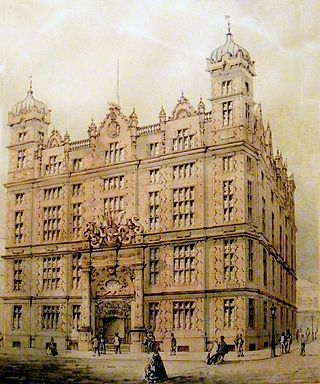
Liverpool Sailors' Home, was open for business in Canning Place, Liverpool, England, from December 1850 to July 1969. The home was designed to provide safe, inexpensive lodging for sailors, and to offer educational and recreational opportunities, in contrast to the temptations on offer in the docklands area.
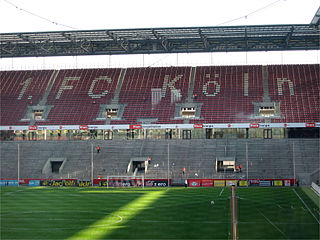
A terrace or terracing in sporting terms refers to the standing area of a sports stadium, particularly in the United Kingdom and Republic of Ireland. It is a series of concrete steps, with intermittent safety barriers installed at specific locations to prevent an excessive movement of people down its slope.
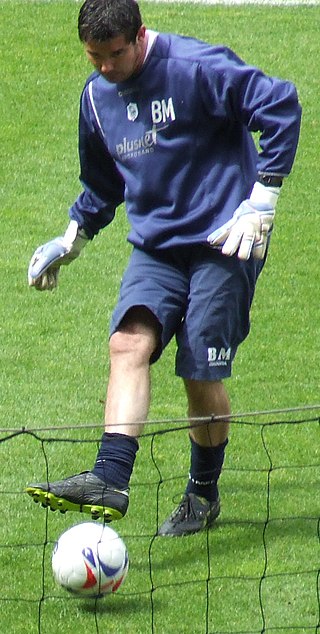
William Mercer is an English former footballer who played as a goalkeeper. He was most recently the goalkeeping coach at Burnley. He is currently with Everton on a temporary basis.
Sir Norman George Bettison, QPM is a British former police officer and the former Chief Constable of West Yorkshire Police. He resigned in October 2012 amidst controversy about his role in the Hillsborough disaster, in which he was involved in the implementation of a cover-up of police errors. He remained the subject of an Independent Police Complaints Commission (IPCC) investigation, and was charged on the 28 June 2017 with four counts of misconduct in public office. The case was dropped on 21 August 2018. Bettison's own book Hillsborough Untold (2016) contains his version of events.
Edward Robin Pearce was an English political journalist and writer, known for being a leader writer for The Daily Telegraph and The Guardian, and writing a number of biographies of political figures.

Hillsborough is a television film written by Jimmy McGovern and starring Annabelle Apsion, Christopher Eccleston and Ricky Tomlinson. Set between 1989 and 1991, the film is a dramatization of the Hillsborough disaster, which saw 97 football supporters lose their lives at Hillsborough in Sheffield. The film won the BAFTA TV Award for Best Single Drama
Peter Wright was the Chief Constable of the South Yorkshire Police force from 1983 to 1990. During that period members of the force he commanded clashed with striking miners during the UK miners' strike (1984–85) and were responsible for the Hillsborough football ground in Sheffield on 15 April 1989 when the Hillsborough disaster occurred, where 97 fans died.

Safe standing is a measure of design in stadia to ensure that spectators are able to stand safely during events. It is important in the context of association football in the United Kingdom, where a series of fatal incidents led to legislation requiring major clubs to develop all-seater stadiums during the 1990s. Since then, fan groups have campaigned against the ban on standing accommodation, arguing that new design options would allow designated standing areas to be built in compliance with all safety laws and guidelines. As these options are outlawed in England and Wales, safe standing in practice originated in continental Europe, primarily Germany. This occurred because although UEFA and FIFA required all-seater stadiums for international competition, it was not mandatory for domestic matches.
Phil Scraton is a critical criminologist, academic and author. He is a social researcher, known particularly for his investigative work into the context, circumstances and aftermath of the 1989 Hillsborough disaster. More recently, he was a member of the Hillsborough Independent Panel and headed its research. Currently he is Professor Emeritus, School of Law at Queen's University Belfast, and formerly Director of the Childhood, Transition and Social Justice Initiative.
Anne Elizabeth Williams was a campaigner for the victims of the Hillsborough disaster of 1989, in which 97 Liverpool football fans, including her son Kevin Williams, died at Hillsborough Stadium in Sheffield.
Sir Murray Stuart-Smith, KCMG, PC is a former English barrister and Appeal Court judge. His 1997 re-examination of Lord Taylor's report into the Hillsborough disaster is seen today as a "debacle".
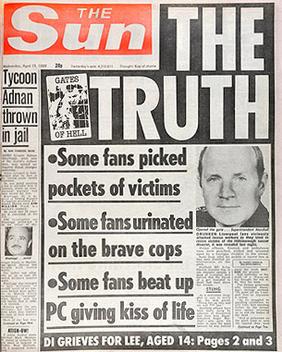
Coverage of the Hillsborough disaster by the British tabloid The Sun led to the newspaper's decline in Liverpool and the broader Merseyside region, with organised boycotts against it. The disaster occurred at a football match between Liverpool and Nottingham Forest. There were a total of 97 fatalities and 766 injuries from the disaster due to gross negligence by the South Yorkshire Police and ambulance services. On 19 April 1989, four days after the incident, The Sun published a front-page story with the headline "The Truth", containing a number of falsehoods alleging that Liverpool supporters were responsible for the incident.








